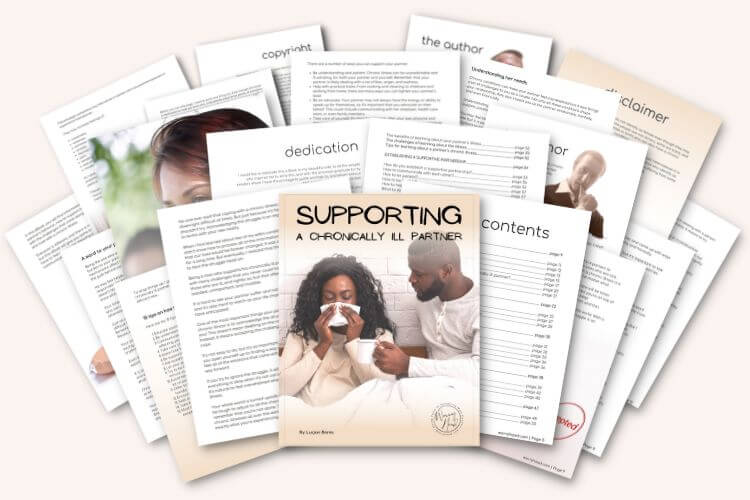How can my chronically ill partner contribute to our relationship?
It can be difficult to feel like you are always the one giving in a relationship, especially when your partner is chronically ill. But it is important to remember that your partner likely feels just as frustrated and wants to contribute as much as they can. So, can my chronically ill partner contribute to our relationship despite the debilitating illness?
The answer is yes, definitely yes!
My wife has two chronic conditions, endometriosis and fibromyalgia. One chronic illness is enough to make your partner feel overwhelmed, but two chronic illnesses may seem like there is no way your partner can contribute to the relationship.
But my wife still tries to contribute as much as possible. It may not always be in the ways that I would like or in the ways that she used to before she became ill, but she still tries. She’s fully independent!
But you are not here to talk about my wife. You want to know how can your chronically ill partner contribute to your relationship. In order to answer that, you need to ask how your partner is feeling.
If your partner feels up to it, there are likely many things they can still do to contribute to the relationship.
They might not be able to work, but they can help with around-the-house chores, take care of the finances, or cook dinner. If your partner is feeling well enough, they might even be able to go on dates with you or go on vacation.
The most important thing to remember is that your partner wants to contribute, but their illness might make it difficult for them to do so. Be patient and understanding with your partner. They are likely doing the best they can.
If your partner is not feeling well, there are still ways they can contribute to the relationship. They can provide emotional support, be a sounding board for your problems, and offer advice when needed. Just because your partner is not physically well, does not mean they cannot contribute to the relationship in other ways.
You know your partner best, so talk to them about how they are feeling and what they can do to help. I find that as long as my wife is up for discussion, we can solve any problems.
Nobody is perfect!
Not me, not even you. And that’s alright.
I’ve been married to my wife for over 10 years and I love her very much. I feel like she is the first person who actually loves me for being me, instead of me feeling I need to put on a show to please someone. I’m only human, I have faults, I also make mistakes, forget things, and above all, I’m clumsy.
What I’m trying to say is that even though I’m healthy and my wife is not, it doesn’t automatically make me better and her worse.
My faults bring anything but a contribution to my marriage whilst my chronically ill partner contributes to our relationship. And even though my mistakes aren’t intentional, they can still annoy the heck out of my wife. It is human. Our reactions are natural.
My wife didn’t cause herself endometriosis, neither she caused her fibromyalgia. She’s simply unfortunate to develop two chronic conditions. Equally, I’m not guilty of being clumsy and faulty.
The important thing is that we communicate with each other, and we understand that nobody is perfect. And even if it means that I have to remind myself sometimes that my wife is doing the best she can, just like I am.
Nobody is perfect, but we can try to be the best we can be for each other.
So before I gave you tips on how your chronically ill partner can contribute to your relationship, I wanted to show you that your partner does the very best to stay well so you don’t have to worry. Your partner tries to be as independent as possible.
That is itself a form of contribution.
If you want to learn how to cope with your partner’s chronic illness, how to support her struggles, and manage a relationship with a chronic condition, I give away a FREE Chapter of my eBook: “Supporting a Chronically Ill Partner”.
This chapter alone has all the comprehensive information about acknowledging the struggles, including:
- A word to your partner.
- A word to you.
- Stepping on eggshells.
- Understanding her needs.
- How to acknowledge having a chronically ill partner?
- Acknowledging can be hard.
- 15 tips on how to do it!
Get the 1st Chapter FREE!
Chronic Illness for Partners

A few ways your partner can help…
Here are some ways that your partner can contribute, even when they are not feeling their best:
Help with household chores because even if your partner isn’t able to do everything they used to, there are probably still some things they can do around the house. If you have been shouldering all of the household responsibilities, ask your partner if they can help out with something specific.
Be supportive. One of the most important things you can do for your partner is to be supportive. This means being understanding when they are not feeling well and being there for them emotionally.
Why is that important?
Because if you give support, your partner can focus on other ways to contribute to your relationship.
Plan fun activities. When your partner is feeling up to it, plan fun activities that you can do together. This can help your partner feel more connected to you and give them something to look forward to. They can contribute by doing some activities with you like you used to.
Keep communication open. Always talk to your partner about how you are both feeling and what you need from each other. Open communication is essential in any relationship, but it can be especially important when one partner is chronically ill.
Your ill partner can contribute by giving you emotional support. My wife does it for me whenever I have bad moments.
What does your partner’s chronic illness teach you?
I can tell you what my partner’s chronic illness teaches me in a nutshell:
- Patience
- Compassion
- Understanding
- Communication
- Appreciation
- Gratitude
My wife shows me what real strength and bravery are. To battle through daily challenges such as chronic fatigue, pain, mood swings, brain fog, and still function doesn’t go unnoticed. I am lucky to have such a wonderful woman who is braver and mentally stronger than many men.
Apart from patience, compassion, understanding, communication, appreciation, and gratitude, she showed me to be more organized, how to handle stress better, how to deal with disappointment, how to be more flexible, how to slow down and relax, how to cherish your time together, how to find joy in small moments.
So, to quickly summarise it in points, here are some lessons from my wife on what your partner’s chronic illness can teach you. Here are 15 examples:
- how to be patient
- how to advocate for yourself
- how to be a better listener
- how to be more present
- how to be grateful for good health
- how to cherish your time together
- how to find joy in small moments
- how to be more organized
- how to be a better communicator
- how to handle stress better
- how to deal with disappointment
- how to be more flexible
- how to show compassion
- how to slow down and relax
- how to appreciate life more

Your partner is capable of more!
Your partner may feel trapped, out of control, and helpless. But here’s the thing, your partner is capable of more than they even realize.
If you think about it, your partner has been managing their chronic illness day in and day out. They are used to dealing with pain, fatigue, anxiety, depression, and more. They have learned how to pace themselves, how to listen to their bodies, how to take care of themselves, how to manage their symptoms, and how to cope with their chronic illness.
All of these skills are transferable to other areas of their life. If you need more tips on how can your partner contribute to your relationship, the next paragraph gives you plenty of examples…
27 examples of how can your chronically ill partner contribute to a relationship.
Let’s get started. Here are 27 examples of how your chronically ill partner can contribute to your relationship:
- They can be understanding and patient when you are not feeling well.
- They can be there for you emotionally.
- They can help you with practical tasks around the house.
- They can help you with child care or pet care.
- They can do light grocery shopping for you.
- They can cook meals for you.
- They can help you with laundry and other household chores.
- They can provide moral support when you are dealing with a difficult situation.
- They can offer words of encouragement when you are feeling down.
- They can be a sounding board for your ideas and concerns.
- They can help you with financial planning and budgeting.
- They can help you to stay organized and on track with your goals.
- They can be a positive influence on your life.
- They can help you to find solutions to problems.
- They can provide companionship and friendship.
- They can offer advice and guidance when you need it.
- They can give you a massage or other forms of touch therapy when you are feeling tense or stressed out.
- They can encourage you to stay active and get exercise when you are feeling tired or sluggish.
- They can offer a shoulder to cry on when you are feeling sad or upset.
- They can help you to celebrate your successes and accomplishments.
- They can be a sounding board for your ideas and concerns.
- They can help you with decision-making.
- They can help you to stay focused and on track.
- They can help you to develop coping skills for dealing with difficult situations.
- They can provide emotional support during times of stress.
- They can offer words of encouragement when you are facing challenges.
- They can be a source of strength and hope during difficult times.
More tips…
- Remember, your partner is still your partner. The illness does not define them.
- Keep communication open and honest. You will only understand what they’re feeling if you listen to them.
- Let them express their needs, feelings, and ideas honestly and directly, without putting them down.
- Tell your partner not to lie about their symptoms.
- Use “I” statements to describe problems to avoid feeling blamed or criticized, and keep the focus on your needs and wants.
- Ask them to avoid endless complaining, it can be draining. Instead, they should talk about how they can change the parts of their life that are making them unhappy.
- Your partner needs to try to adopt a positive outlook to find humor in situations.
- They should be honest and transparent to bring you both closer.
- Remember how you and your partner overcame difficult situations in the past and use those strategies.
- Chronic illness can cause feelings of anger and depression. Give yourself and your partner room to feel your emotions. Take a moment alone if you need it.
- Remain intimate. Intimacy does not necessarily mean sex. It means spending time together, holding hands, reading together, and even talking.
- Find time to do the things you both love.
- Ask your partner to let you know what to expect of them as they heal and what not to expect.
- They need to let go of guilt about not doing the same things or going to the same places they used to.
- Your partner should be gentle with themselves.
- They should commit to getting and staying emotionally and spiritually strong.
Get the 1st Chapter FREE!
Chronic Illness for Partners



About Me
Hi, I’m Lucjan! The reason why I decided to create this blog was my beautiful wife, who experienced a lot of pain in life, but also the lack of information about endometriosis and fibromyalgia for men…
